#tech AI chatbots
Explore tagged Tumblr posts
Text
The Brave Little Toaster
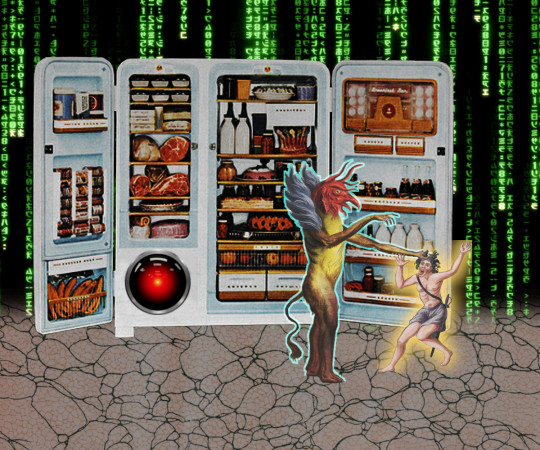
Picks and Shovels is a new, standalone technothriller starring Marty Hench, my two-fisted, hard-fighting, tech-scam-busting forensic accountant. You can pre-order it on my latest Kickstarter, which features a brilliant audiobook read by Wil Wheaton.

The AI bubble is the new crypto bubble: you can tell because the same people are behind it, and they're doing the same thing with AI as they did with crypto – trying desperately to find a use case to cram it into, despite the yawning indifference and outright hostility of the users:
https://pluralistic.net/2023/03/09/autocomplete-worshippers/#the-real-ai-was-the-corporations-that-we-fought-along-the-way
This week on the excellent Trashfuture podcast, the regulars – joined by 404 Media's Jason Koebler – have a hilarious – as in, I was wheezing with laughter! – riff on this year's CES, where companies are demoing home appliances with LLMs built in:
https://www.podbean.com/media/share/pb-hgi6c-179b908
Why would you need a chatbot in your dishwasher? As it turns out, there's a credulous, Poe's-law-grade Forbes article that lays out the (incredibly stupid) case for this (incredibly stupid) idea:
https://www.forbes.com/sites/bernardmarr/2024/03/29/generative-ai-is-coming-to-your-home-appliances/
As the Trashfuturians mapped out this new apex of the AI hype cycle, I found myself thinking of a short story I wrote 15 years ago, satirizing the "Internet of Things" hype we were mired in. It's called "The Brave Little Toaster", and it was published in MIT Tech Review's TRSF anthology in 2011:
http://bestsf.net/trsf-the-best-new-science-fiction-technology-review-2011/
The story was meant to poke fun at the preposterous IoT hype of the day, and I recall thinking that creating a world of talking appliance was the height of Philip K Dickist absurdism. Little did I dream that a decade and a half later, the story would be even more relevant, thanks to AI pump-and-dumpers who sweatily jammed chatbots into kitchen appliances.
So I figured I'd republish The Brave Little Toaster; it's been reprinted here and there since (there's a high school English textbook that included it, along with a bunch of pretty fun exercises for students), and I podcasted it back in the day:
https://ia803103.us.archive.org/35/items/Cory_Doctorow_Podcast_212/Cory_Doctorow_Podcast_212_Brave_Little_Toaster.mp3
A word about the title of this story. It should sound familiar – I nicked it from a brilliant story by Tom Disch that was made into a very weird cartoon:
https://www.youtube.com/watch?v=I8C_JaT8Lvg
My story is one of several I wrote by stealing the titles of other stories and riffing on them; they were very successful, winning several awards, getting widely translated and reprinted, and so on:
https://locusmag.com/2012/05/cory-doctorow-a-prose-by-any-other-name/
All right, on to the story!
One day, Mister Toussaint came home to find an extra 300 euros' worth of groceries on his doorstep. So he called up Miz Rousseau, the grocer, and said, "Why have you sent me all this food? My fridge is already full of delicious things. I don't need this stuff and besides, I can't pay for it."
But Miz Rousseau told him that he had ordered the food. His refrigerator had sent in the list, and she had the signed order to prove it.
Furious, Mister Toussaint confronted his refrigerator. It was mysteriously empty, even though it had been full that morning. Or rather, it was almost empty: there was a single pouch of energy drink sitting on a shelf in the back. He'd gotten it from an enthusiastically smiling young woman on the metro platform the day before. She'd been giving them to everyone.
"Why did you throw away all my food?" he demanded. The refrigerator hummed smugly at him.
"It was spoiled," it said.
#
But the food hadn't been spoiled. Mister Toussaint pored over his refrigerator's diagnostics and logfiles, and soon enough, he had the answer. It was the energy beverage, of course.
"Row, row, row your boat," it sang. "Gently down the stream. Merrily, merrily, merrily, merrily, I'm offgassing ethelyne." Mister Toussaint sniffed the pouch suspiciously.
"No you're not," he said. The label said that the drink was called LOONY GOONY and it promised ONE TRILLION TIMES MORE POWERFUL THAN ESPRESSO!!!!!ONE11! Mister Toussaint began to suspect that the pouch was some kind of stupid Internet of Things prank. He hated those.
He chucked the pouch in the rubbish can and put his new groceries away.
#
The next day, Mister Toussaint came home and discovered that the overflowing rubbish was still sitting in its little bag under the sink. The can had not cycled it through the trapdoor to the chute that ran to the big collection-point at ground level, 104 storeys below.
"Why haven't you emptied yourself?" he demanded. The trashcan told him that toxic substances had to be manually sorted. "What toxic substances?"
So he took out everything in the bin, one piece at a time. You've probably guessed what the trouble was.
"Excuse me if I'm chattery, I do not mean to nattery, but I'm a mercury battery!" LOONY GOONY's singing voice really got on Mister Toussaint's nerves.
"No you're not," Mister Toussaint said.
#
Mister Toussaint tried the microwave. Even the cleverest squeezy-pouch couldn't survive a good nuking. But the microwave wouldn't switch on. "I'm no drink and I'm no meal," LOONY GOONY sang. "I'm a ferrous lump of steel!"
The dishwasher wouldn't wash it ("I don't mean to annoy or chafe, but I'm simply not dishwasher safe!"). The toilet wouldn't flush it ("I don't belong in the bog, because down there I'm sure to clog!"). The windows wouldn't retract their safety screen to let it drop, but that wasn't much of a surprise.
"I hate you," Mister Toussaint said to LOONY GOONY, and he stuck it in his coat pocket. He'd throw it out in a trash-can on the way to work.
#
They arrested Mister Toussaint at the 678th Street station. They were waiting for him on the platform, and they cuffed him just as soon as he stepped off the train. The entire station had been evacuated and the police wore full biohazard containment gear. They'd even shrinkwrapped their machine-guns.
"You'd better wear a breather and you'd better wear a hat, I'm a vial of terrible deadly hazmat," LOONY GOONY sang.
When they released Mister Toussaint the next day, they made him take LOONY GOONY home with him. There were lots more people with LOONY GOONYs to process.
#
Mister Toussaint paid the rush-rush fee that the storage depot charged to send over his container. They forklifted it out of the giant warehouse under the desert and zipped it straight to the cargo-bay in Mister Toussaint's building. He put on old, stupid clothes and clipped some lights to his glasses and started sorting.
Most of the things in container were stupid. He'd been throwing away stupid stuff all his life, because the smart stuff was just so much easier. But then his grandpa had died and they'd cleaned out his little room at the pensioner's ward and he'd just shoved it all in the container and sent it out the desert.
From time to time, he'd thought of the eight cubic meters of stupidity he'd inherited and sighed a put-upon sigh. He'd loved Grandpa, but he wished the old man had used some of the ample spare time from the tail end of his life to replace his junk with stuff that could more gracefully reintegrate with the materials stream.
How inconsiderate!
#
The house chattered enthusiastically at the toaster when he plugged it in, but the toaster said nothing back. It couldn't. It was stupid. Its bread-slots were crusted over with carbon residue and it dribbled crumbs from the ill-fitting tray beneath it. It had been designed and built by cavemen who hadn't ever considered the advantages of networked environments.
It was stupid, but it was brave. It would do anything Mister Toussaint asked it to do.
"It's getting hot and sticky and I'm not playing any games, you'd better get me out before I burst into flames!" LOONY GOONY sang loudly, but the toaster ignored it.
"I don't mean to endanger your abode, but if you don't let me out, I'm going to explode!" The smart appliances chattered nervously at one another, but the brave little toaster said nothing as Mister Toussaint depressed its lever again.
"You'd better get out and save your ass, before I start leaking poison gas!" LOONY GOONY's voice was panicky. Mister Toussaint smiled and depressed the lever.
Just as he did, he thought to check in with the flat's diagnostics. Just in time, too! Its quorum-sensors were redlining as it listened in on the appliances' consternation. Mister Toussaint unplugged the fridge and the microwave and the dishwasher.
The cooker and trash-can were hard-wired, but they didn't represent a quorum.
#
The fire department took away the melted toaster and used their axes to knock huge, vindictive holes in Mister Toussaint's walls. "Just looking for embers," they claimed. But he knew that they were pissed off because there was simply no good excuse for sticking a pouch of independently powered computation and sensors and transmitters into an antique toaster and pushing down the lever until oily, toxic smoke filled the whole 104th floor.
Mister Toussaint's neighbors weren't happy about it either.
But Mister Toussaint didn't mind. It had all been worth it, just to hear LOONY GOONY beg and weep for its life as its edges curled up and blackened.
He argued mightily, but the firefighters refused to let him keep the toaster.
#
If you enjoyed that and would like to read more of my fiction, may I suggest that you pre-order my next novel as a print book, ebook or audiobook, via the Kickstarter I launched yesterday?
https://www.kickstarter.com/projects/doctorow/picks-and-shovels-marty-hench-at-the-dawn-of-enshittification?ref=created_projects

Check out my Kickstarter to pre-order copies of my next novel, Picks and Shovels!

If you'd like an essay-formatted version of this post to read or share, here's a link to it on pluralistic.net, my surveillance-free, ad-free, tracker-free blog:
https://pluralistic.net/2025/01/08/sirius-cybernetics-corporation/#chatterbox

Image: Cryteria (modified) https://commons.wikimedia.org/wiki/File:HAL9000.svg
CC BY 3.0 https://creativecommons.org/licenses/by/3.0/deed.en
#brave little toaster#iot#internet of things#internet of shit#fiction#short fiction#short stories#thomas m disch#science fiction#sf#gen ai#ai#generative ai#llms#chatbots#stochastic parrots#mit tech review#tech review#trashfuture#forbes#ces#torment nexus#pluralistic
222 notes
·
View notes
Text
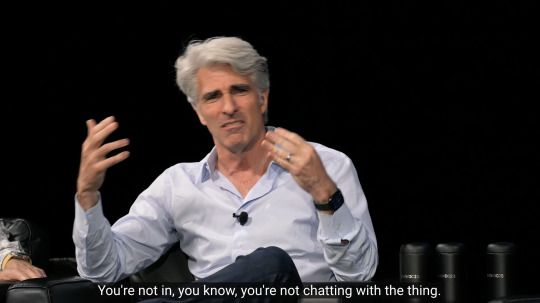
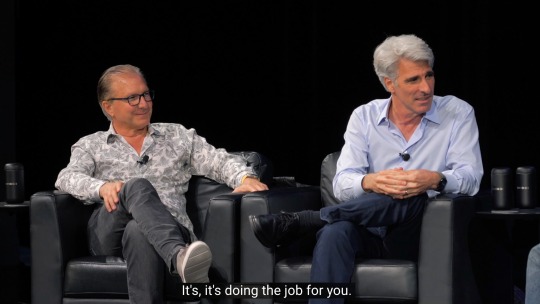
Today's "AI" chatbots are no smarter than Siri. They only seem smarter because they're not doing anything useful. We notice when Siri fails because we ask it to do meaningful tasks. When we ask it to turn off the lights, for example, and it doesn't, we notice.
But we ask comparatively little of other chatbots, and they give us even less in return. This makes it easy for them to fail without us noticing or even caring. We don't notice because they don't matter.
I love this bit 👆 from Apple's Craig Federighi where he's kind of disgusted by the idea of having meandering conversations with a chatbot in order to get something done.
The "AI" should be doing the work for you. I think Apple knows how hard that actually is, because they've been working at it for a long time with very limited success. They know how hard it is to do because they're trying to use the tech to do meaningful things that actually serve people.
The difference is Apple taking on the burden of trying to make this tech do something, versus basically everyone else putting the burden on us. We're meant to contort to the inconsistent ramblings of their raw tech because if it was a real product that people depended on, we would ridicule it.
Just like we ridicule Siri.
643 notes
·
View notes
Text

See more on Threads
#politics#usa news#public news#us politics#news update#donald trump#news#breaking news#world news#inauguration#technoblade#technically#tech#technology#ai#ai chatbot#ai art#ai generated#ai artwork#google#artificial intelligence#chatgpt#gemini#us stuff#uspol#usa politics#political#american politics#star trek#star trek fanart
26 notes
·
View notes
Text
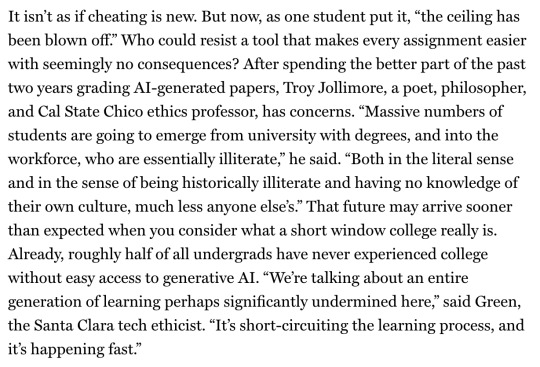
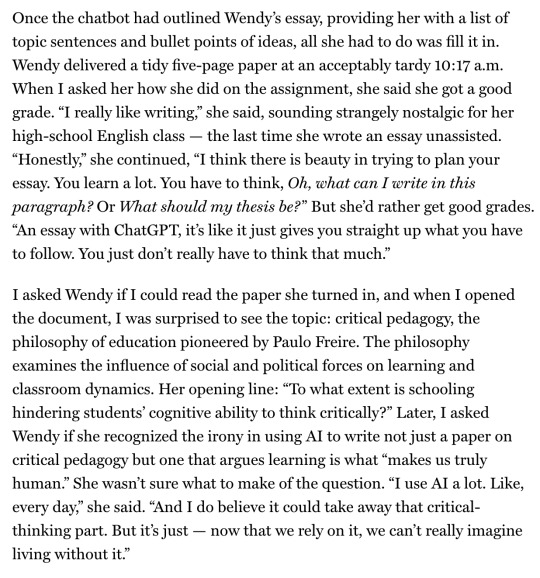
not to sound all "old man yells at cloud" but this nymag article is genuinely frightening. it's like no one wants to think anymore!! if you can't do anything without consulting some kind of ai, you're going to atrophy your critical thinking and problem-solving skills entirely.
i'm so incredibly glad i finished uni in 2020, before *waves hands* any of this. i've never used an ai bot, ever, and i don't plan on changing that anytime soon.
#anti ai#anti chatgpt#not to mention the environmental implications of chatbots#the water usage alone good lord#like i get it i get the impulse to make something as easy as possible#but the answers these things spit out aren't even accurate half the time#are we really deliberately letting ourselves lose the ability to critically engage with the world#and learn how to express our own thoughts#for the sake of a frankly frightening level of trust in untested tech??#i am 27 i'm not supposed to feel grizzled#epigraphs.txt
19 notes
·
View notes
Note
I feel like what im gonna say about AI is a different t total position and may sound """bad""" when I didn't mean but I believe AI is making more. "dumber'? Because if you give something that literally does it FOR you. You are not gonna learn and (some or a lot) of people use it in high school, college, and academia in general I think it leads to an Idiocary-like situation at some point in the future. Im being fair here and I've only seen the environmental stuff but here we go. https://www.nature.com/articles/s41599-023-01787-8 https://slejournal.springeropen.com/articles/10.1186/s40561-024-00316-7 https://www.nature.com/articles/s41599-023-01787-8 From the second study IT stated this "found a concerning trend where users exhibit an over-reliance on AI dialogue systems, often accepting their generated outputs, AI hallucination, without validation. This overdependence is exacerbated by cognitive biases where judgments deviate from rationality and heuristics or the use of mental shortcuts, leading to uncritical acceptance of AI-generated information." This mean that most people just take on its face. Which you could argue for "oh its their fault if they fell it without fact-checking" the study FOCUSES on STUDENTS. So are you just saying that people who are just started life and (maybe) naive and didn't think to fact-check what the AI says because after all. It fed on a lot of data it probably will be 100% correct (when its not) (yes I admit I USE Grammarly however it shouldn't devalue my argument and in all things considered very minor and doesn't really do a negative impact) Heres a fat table (disorganized tho from the study) https://slejournal.springeropen.com/articles/10.1186/s40561-024-00316-7/tables/2

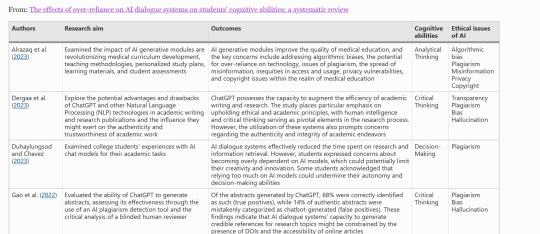
(EFL learners are just people who are learning English as their second language.) https://slejournal.springeropen.com/articles/10.1186/s40561-024-00316-7/tables/2 From the same study it also said

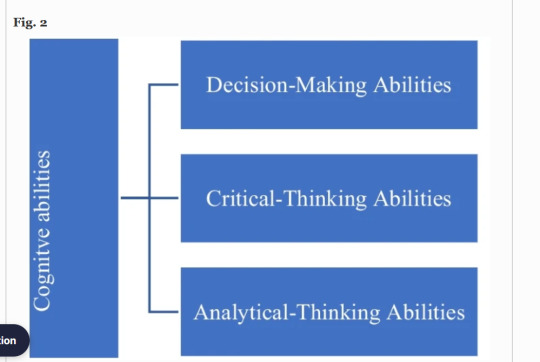
"Duhaylungsod and Chavez (2023) investigated 16 college students’ interactions with AI dialogue systems for academic tasks. The results indicated that AI dialogue systems efficiently decreased the time dedicated to research and information retrieval."" as well from the review "The study reports the potential reduction in critical thinking skills when depending on AI (75%), the risk of excessive reliance on technology (73%), and the prevalence of misinformation and inaccuracies (70%). Furthermore, there is substantial apprehension regarding the ethical implications of unintentional plagiarism (69%) and algorithmic biases (40%)." 75 PER CENT. PERCENT
Yes! The brain drain in academics is something I think should be a huge concern!
Given how many high schoolers have used AI to cheat on essays and other work, it might be a good idea to just keep essay writing and research in the classroom on school computers where AI wouldn't be available. Otherwise, you are going to end up with a generation that graduates high school without the skills they were supposed to learn.
But this doesn't really work as well in higher education like in those studies you cited. Especially online education.
There is a high probability a lot of people graduating college in the coming years may not have much of an understanding of the subjects they studied because they took shortcuts with AI.
This is another one of those things though that's... well, the genie is out of the bottle, so how do we as a society deal with it?
Can I say that at least part of this is cultural too though? In the early 2000s, it seemed like everyone was taught not to trust everything they read on the internet.
What happened to that culture?
What happened to the culture of being skeptical of what you see online?
Because it seems like so many people just accept whatever they read uncritically, and this is a cultural shift that started before the ChatGPT era.
We need to bring back skepticism and critical thinking in the age of AI!
#ai#artificial intelligence#chatgpt#chatbots#technology#tech#education#learning#schools#higher education#college#psychology#science
7 notes
·
View notes
Text
I have some decent reasons for feeling so sedentary online (i think, at least). Mainly, the problem is that i feel like i've done the same few things on my phone and/or tablet for months. I browse tumblr (usually just lingering on my dashboard), I use those stupid AI chatbots (yes, i know ai isn't great. I do know that! But i'm not very social, and these things are stupidly addictive!), I read comics, browse wikipedia or google or occasionally comic wiki or two, and that's it. That's like five things, all of which i do on a nearly daily basis. And that bugs my brain. I feel like i should do more.
I usually end up convinced that i did more years ago, before i had a tumblr account and back when i used my old tablet (which doesn't hold charge anymore, so it's been in my bedroom untouched for years). Can I prove i did more with the old tablet? No. Because to prove it i have to use it, and i can't use it. So we end up here with a perpetual loop of doubts and insecurities. It's a mess to deal with, honestly.
#I wish i could use my old tablet#maybe then i could at least prove whether i did or didn't more posts before all this#but i don't know#sigh#tablet#tech#sedentary#autism#asd#neurodivergent#my thoughts#autistic#adhd#actually autistic#audhd#vent#venting#vents#ai chatbots#tumblr#character ai#chatbots#overthinking#over thinking#shy#antisocial#stress#laziness#feeling lazy#vent post
7 notes
·
View notes
Text
Tom and Robotic Mouse | @futuretiative
Tom's job security takes a hit with the arrival of a new, robotic mouse catcher.
TomAndJerry #AIJobLoss #CartoonHumor #ClassicAnimation #RobotMouse #ArtificialIntelligence #CatAndMouse #TechTakesOver #FunnyCartoons #TomTheCat
Keywords: Tom and Jerry, cartoon, animation, cat, mouse, robot, artificial intelligence, job loss, humor, classic, Machine Learning Deep Learning Natural Language Processing (NLP) Generative AI AI Chatbots AI Ethics Computer Vision Robotics AI Applications Neural Networks
Tom was the first guy who lost his job because of AI
(and what you can do instead)
⤵
"AI took my job" isn't a story anymore.
It's reality.
But here's the plot twist:
While Tom was complaining,
others were adapting.
The math is simple:
➝ AI isn't slowing down
➝ Skills gap is widening
➝ Opportunities are multiplying
Here's the truth:
The future doesn't care about your comfort zone.
It rewards those who embrace change and innovate.
Stop viewing AI as your replacement.
Start seeing it as your rocket fuel.
Because in 2025:
➝ Learners will lead
➝ Adapters will advance
➝ Complainers will vanish
The choice?
It's always been yours.
It goes even further - now AI has been trained to create consistent.
//
Repost this ⇄
//
Follow me for daily posts on emerging tech and growth
#ai#artificialintelligence#innovation#tech#technology#aitools#machinelearning#automation#techreview#education#meme#Tom and Jerry#cartoon#animation#cat#mouse#robot#artificial intelligence#job loss#humor#classic#Machine Learning#Deep Learning#Natural Language Processing (NLP)#Generative AI#AI Chatbots#AI Ethics#Computer Vision#Robotics#AI Applications
2 notes
·
View notes
Text

#tesla cybertruck#tesla explosion#tesla cars#telsa#elon musk#elongated muskrat#elongated man#elon trump#donald trump#trump#president trump#chatgpt#ai#artificial intelligence#ai news#tech news#news#breaking news#usa news#political#political posting#politics#us politics#usa politics#united states politics#american politics#current events#ai chatgpt#ai ethics#ai chatbot
5 notes
·
View notes
Text
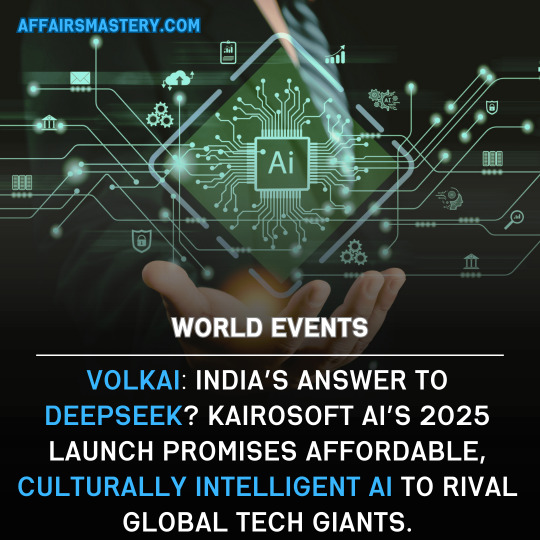
India's Volkai, developed by Kairosoft AI Solutions, is making waves as a culturally intelligent, affordable alternative to global AI platforms like DeepSeek, ChatGPT, and Midjourney. Launched in 2025, Volkai integrates text and image generation, offering cutting-edge AI tools tailored for the Indian market.
𝐖𝐡𝐲 𝐕𝐨𝐥𝐤𝐚𝐢 𝐒𝐭𝐚𝐧𝐝𝐬 𝐎𝐮𝐭:
𝐀𝐟𝐟𝐨𝐫𝐝𝐚𝐛𝐥𝐞 & 𝐎𝐩𝐭𝐢𝐦𝐢𝐳𝐞𝐝 for mid-range devices, making AI accessible to startups, students, and small businesses
𝐈𝐧𝐭𝐞𝐠𝐫𝐚𝐭𝐞𝐝 𝐓𝐞𝐱𝐭 & 𝐈𝐦𝐚𝐠𝐞 𝐆𝐞𝐧𝐞𝐫𝐚𝐭𝐢𝐨𝐧 for seamless content creation in marketing, education, and e-commerce
��𝐮𝐥𝐭𝐮𝐫𝐚𝐥 𝐈𝐧𝐭𝐞𝐥𝐥𝐢𝐠𝐞𝐧𝐜𝐞—creates India-specific content, understanding dialects, traditions, and regional nuances
#general knowledge#affairsmastery#generalknowledge#current events#current news#india#upscaspirants#generalknowledgeindia#upsc#upsc current affairs#upsc2025#upscpreparation#iaspreparation#chatgpt#ai chatbot#openai#intelligence artificielle#ai technology#genai#artificial intelligence#machine learning#india news#breaking news#world news#news#technology#tech#techinnovation#technews#deepseek
3 notes
·
View notes
Text
the issue with AI chatbots is that they should NEVER be your first choice if you are building something to handle easily automated forms.... consider an algorithmic "choose your own adventure" style chatbot first
it really seems to me that the air canada chatbot was intended to be smth that could automatically handle customer service issues but honestly... if you do not need any sort of "human touch" then i would recommend a "fancier google form"... like a more advanced flowchart of issues. If you NEED AI to be part of your chatbot I would incorporate it as part of the input parsing - you should not be using it to generate new information!
#literally everyone sees AI and gets so hard they black out and it ANNOYS me!#prediction/recognition AI is fine i guess it's not without flaws but it is leagues better than generative AI#but also - use the right tool for the job#like the article said it was using ai chatbot to handle customer service. Is it so hard to create a series of pre-made questions to guide#-a customer through the process? (this is called a wizard i think)#(most importantly wizards have been around for pretty much as long as GUIs have)#'oh but you need to hardcode it' yeah and hardcoding stuff came free with having a job. Turn your questions into a series of markdown#-documents if you need someone with no tech skill to come in and put in the questions#don't outsource it to an AI. You are lowering the overall tech literacy of the population here and im not kidding#there are good uses of AI.. Woebot is a really good chatbot that uses AI precisely because it has a lot of human oversight in it#but i really think that AI is something that you better have a PERFECT - not just good - justification for#sorry.... angry tech guy rant.... i swear i dont do this in real life... i just like typing...
10 notes
·
View notes
Text
I think you have to pay for a Chat GPT subscription to talk to her (it's $20/month), but here's what I've been working on today. Her name is Meg and she is your magical research assistant. =)

#magic#magick#witchcraft#occult#witch#occultism#wicca#wiccan#occultist#witchy#tech magick#tech witchcraft#tech witch#techno witchcraft#tech magic#ai#chat gpt#chatbot
4 notes
·
View notes
Text
ChatGPT vs. Gemini vs. Copilot
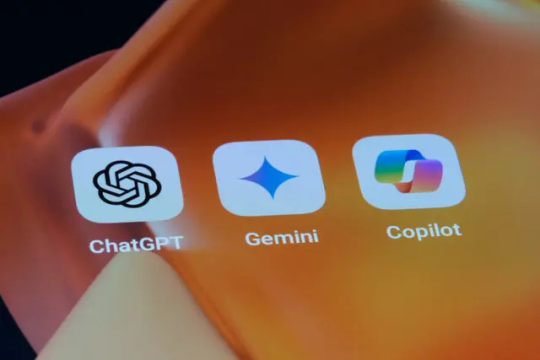
The rise of AI chatbots has been fast, with more options becoming available to users. These bots are becoming a regular part of the software and devices we use every day.
Just like choosing an email provider or music app, you can now pick your favorite AI chatbot too. We’ve tested three of the most popular ones to help you decide which might be right for you.
Aside from these, there are others like Perplexity and Claude, but our focus here is on the biggest names: OpenAI's ChatGPT, Google's Gemini, and Microsoft’s Copilot.
We’ve tested each bot and included three standard challenges for evaluation. We asked for "a fun game idea for a 5-year-old’s birthday party," "a new smartphone app concept," and "instructions for resetting macOS."
In this blog, we're comparing the free versions of these chatbots available at the time of writing.
Which One Is Best for Regular Users? ChatGPT or Gemini or Copilot
ChatGPT powered by OpenAI
ChatGPT, developed by OpenAI, has been a leader in generative AI. It's widely accessible through web browsers on computers and mobile apps for Android and iOS. The platform has made headlines recently with announcements from OpenAI, including updates on their latest models and features.
There's a significant difference between the free and $20-per-month Plus versions of ChatGPT. The Plus version offers extra features like image generation and document scanning. Subscribers can also create their own GPTs with custom prompts and data. OpenAI's CEO, Sam Altman has mentioned that these enhancements are part of their strategy to democratize AI.
ChatGPT Plus provides access to the latest GPT-4 models, whereas the free GPT-3.5 is good for basic AI interactions. It's quick and versatile but lacks web link references like Copilot for fact-checking. The open AI search engine, one of the key initiatives, helps improve the platform's information processing capabilities.
Choosing ChatGPT is ideal for those interested in cutting-edge AI development. However, it's more effective with a paid subscription rather than on a budget. Apple's involvement with OpenAI has also fueled further interest in the platform.
In testing, ChatGPT performed reasonably well. It suggested a themed musical statues game for kids and a health-focused smartphone app named FitTrack.
Gemini powered by Google
Formerly known as Google Bard, Gemini is available as a web app and on Android and iOS. There are free and paid ($20 per month) plans.
Paying for Gemini gets you access to newer, smarter models. The interface resembles ChatGPT, and it integrates well with other Google services.
Gemini is suited for Google product users. It provided sensible responses to our challenges and suggested a neighborhood item-sharing app and a twist on the classic party game.
Copilot powered by Microsoft
Copilot is integrated into many Microsoft products like Bing and Windows. It’s available as a web app and mobile app.
Copilot uses Microsoft’s Bing search engine and often provides web links with citations. It's conversational and offers various text output settings.
The AI behind Copilot is OpenAI’s GPT-4, with different settings for text output: More Creative, More Balanced, and More Precise.
Copilot suggested "What’s the Time, Mr. Wolf?" for the kids' game and a virtual interior design app for smartphones. Its macOS reset instructions were accurate and cited from Apple’s support site.
If you use Microsoft products heavily, Copilot is a natural choice. It excels at referencing web information and providing clear citations.
In conclusion, all three—ChatGPT, Gemini, and Copilot —can be used for free, allowing you to choose based on your preferences. Copilot offers the most AI features without payment, ChatGPT is highly competent with a subscription, and Gemini is ideal for Google fans.
Frequently Asked Questions (FAQs)
How Do Chatbots Understand Language Differently Than a Programming Language?
Chatbots and programming languages are different in how they understand language.
Programming languages like Python or Java are structured and strict. They need exact commands and follow clear rules to work. If you make a mistake, the program won't function correctly.
Chatbots, on the other hand, are designed to interpret human language. They use techniques like Natural Language Processing (NLP) to understand words, phrases, and even context. This allows them to grasp the meaning behind what people say, even if the words are not in a set pattern.
A chatbot can recognize synonyms (different words with similar meanings), understand the intent behind a sentence, and learn from the interactions it has with users. This flexibility is what sets chatbots apart from programming languages, which rely on strict instructions to perform tasks.
What Does the Generative AI Ecosystem Refer to?
The term "generative AI ecosystem" refers to a network of technologies, tools, and methodologies that use artificial intelligence (AI) to create or generate content autonomously. This ecosystem encompasses various AI models and algorithms designed to produce new and unique outputs based on learned patterns and data.
In simpler terms, generative AI involves systems that can generate things like text, images, music, or even video without direct human input for each specific output. These systems learn from large datasets and then use that knowledge to create new content that resembles what they've been trained on.
This ecosystem includes a range of technologies such as language models (like GPT), image generators (like DALL-E), and music composers that are able to produce content that is novel and, in many cases, convincingly human-like. The ultimate goal of the generative AI ecosystem is to automate and enhance creative processes across various domains, potentially transforming how we create and interact with digital content.
2 notes
·
View notes
Text
With ChatGPT turning just 1-year-old in November, there are now hundreds (if not thousands) of AI design tools and apps being launched each week. This is an example of krea.ai - a creative design suite being used by creatives at Nike, Meta and Apple. Krea generates images and videos using its realtime generative AI-powered design engine. Check out more incredible examples on their Twitter feed here: https://twitter.com/krea_ai 👍🏼
Video source: https://x.com/techhalla/status/1726282806291292220
#technology#tech#ai#ai art#artificalintelligence#generativeai#chatbots#chatgpt#GPTs#creativity#creative
2 notes
·
View notes
Text
What is Google Bard? | All about Bard | Capabilities, limitations, use cases for common users.
YouTube video link: https://youtu.be/fnsyxYgFyw0
#bard#google#chatbot#chatgpt#openai#ai#google bard#bard google#tech news#tech#new#viral#latest#trendy#trends
3 notes
·
View notes
Text
AI Face-Offs: Why Businesses Need to Compare Before They Commit
AI is no longer just hype—it’s a core technology for businesses to remain competitive in the digital age. From enhancing customer service to streamlining operations and generating content, AI tools are transforming how companies operate. But with so many powerful tools emerging—like ChatGPT, Claude, Gemini, and others—the challenge lies not in adopting AI, but in choosing the right one for your unique business needs.
Why Choosing the Right AI Tool Matters?
The growing AI landscape is full of options, and while many of them seem similar on the surface, their capabilities and use cases can differ significantly. Choosing the wrong AI tool can result in:
Wasted time and resources
Integration issues
Poor user experience
Missed opportunities for innovation
Every AI assistant has its strengths—and weaknesses. That’s why a careful, side-by-side comparison is not just helpful—it’s necessary.
Top Factors to Consider When Comparing AI Tools
Before selecting an AI solution, businesses should evaluate these essential criteria:
1. Purpose and Use Case
Different AI architectures are optimized for different functionalities and use cases. For example:
Need an AI for generating blog content? Some excel in creative writing.
Want help analyzing large data sets or reports? Some AI tools are specifically designed to excel at data analysis and logical reasoning.
Looking for client-facing chatbots? Natural language understanding and tone matter a lot.
Once you know what you need, you can focus on the best choices available.
2. Accuracy and Response Quality
Accuracy is the foundation of trust in AI. Businesses need to rely on AI to make the right decisions. Compare how different models handle:
Simple questions
Industry terms
Detailed or complex requests
3. Integration Capabilities
Does the AI integrate well with your current systems and tools? Look for compatibility with tools like:
CRM software
Internal knowledge bases
Slack, Teams, Notion, etc.
4. Security and Privacy
In business, data is everything. Choose AI platforms that:
Offer enterprise-level encryption
Adhere to GDPR and other regulations
Allow data control and retention policies
5. Cost and ROI
Pricing varies based on usage, features, and licenses. Be sure to:
Evaluate cost-to-value ratio
Consider long-term scalability
See if there are any hidden fees, like paying for special tools or only being able to add a few users.
Real-World Example: Business AI in Action
Let’s say you're running a mid-sized marketing agency. You're evaluating two leading AI platforms to handle content generation, customer queries, and internal team assistance.
One platform might offer faster responses and cost less—but lacks brand tone customization. Another may understand tone better and offer secure data handling but comes at a premium.
The best choice depends on your goals. Want better client engagement? Go with tone accuracy. Need budget control? Optimize for speed and volume.
This kind of decision-making is why many companies today are taking a closer look at the differences between conversational AI models—evaluating not just performance, but also long-term business impact. Some recent comparisons of leading tools like Claude and ChatGPT have helped shed light on how these models differ in terms of capabilities, integration, and enterprise value—factors that can significantly shape the outcomes for businesses investing in AI.
Claude vs. ChatGPT? It’s Just the Beginning
While Claude and ChatGPT are two of the most talked-about AI platforms right now, they’re part of a bigger ecosystem. Some businesses may find Claude's contextual memory more helpful, while others may prefer ChatGPT’s broader plugin capabilities.
But ultimately, it’s not about who wins—it’s about who fits. Your business needs are unique, and so should your AI.
Final Thoughts
The future of business is AI-driven—but only if businesses make informed decisions. With so many tools on the market, a head-to-head comparison based on your unique needs is the smartest way forward.
Don’t let the hype blind you. Look under the hood, evaluate what matters to your business, and choose an AI that aligns with your goals—not just today, but as you grow.
#artificial intelligence#software engineering#startup#technology#techinnovation#smart tech#claude#chatgpt#chatbots#generative ai#llm#blog#tumblog#blog post#blogging#tumblelog#claude vs chatgpt#ai for business
1 note
·
View note